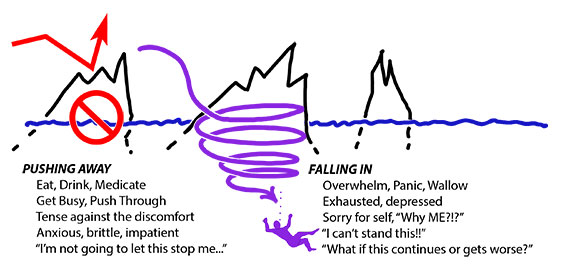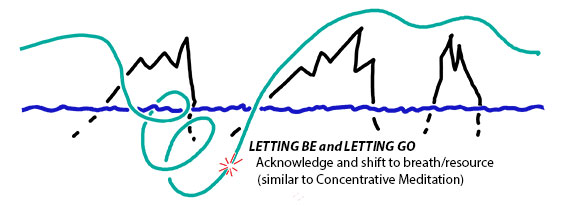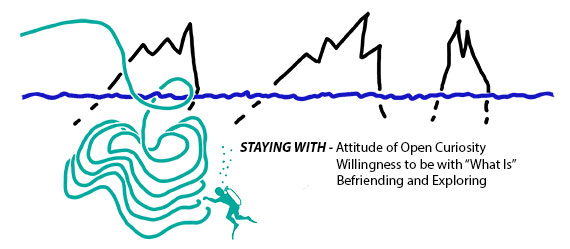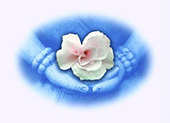Go to the Graduate page to see links to other graduate meetings
The Gift and Power of Emotional Courage by Susan David [16 min]
Radical Acceptance is a Prerequisite for Change by Tara Brach [2 min]
One Moment at a Time by Vidyamala Burch [2 min]
Printed material discussed at this meeting:
"Radical Acceptance" excerpt by Tara Brach
The way out of our cage begins with accepting absolutely everything about ourselves and our lives, by embracing with wakefulness and care our moment-to-moment experience. By accepting absolutely everything, what I mean is that we are aware of what is happening within our body and mind in any given moment, without trying to control or judge or pull away. I do not mean that we are putting up with harmful behavior - our own or another's. This is an inner process of accepting our actual, present-moment experience. It means feeling sorrow and pain without resisting. It means feeling desire or dislike without judging ourselves for the feeling or being driven to act on it.
This is what I call Radical Acceptance. If we are holding back from any part of our experience, if our heart shuts out any part of who we are and what we feel, we are fueling the fears and feelings of separation that sustain the trance of unworthiness. Radical Acceptance directly dismantles the very foundations of this trance.
- from Radical Acceptance: Embracing Your LIfe with the Heart of a Buddha by Tara Brach
- see also You Are Not Your Space Suit Self by Tara Brach (excerpted from True Refuge)
So what do you do when you have a jittery feeling or a tightness or a choking sensation in your throat? If you’re like most of us, you try to get rid of it. Maybe you curse it a little: “Why does this stupid feeling have to come now, just when I need to be my best?” Or maybe you put yourself down: “If I were a better person, I wouldn’t freeze up this way.” Maybe you do deep breathing exercises, or have a drink or a cigarette.
What doesn’t occur to you, unless you know Focusing, is to listen to the feeling, to let it speak to you.
And yet, when you let the feeling speak to you, you are allowing yourself to be open to the depth and richness of your whole self. Furthermore, when you listen to the feeling, it is much more likely to relax, release, and let you go on with what you’re doing in a clear and centered way. You might even move forward in this area of your life in ways that surprise and delight you
Focusing is the process of listening to your body in a gentle, accepting way and hearing the messages that your inner self is sending you. It’s a process of honoring the wisdom that you have inside you, becoming aware of the subtle level of knowing that speaks to you through your body.
- see What is Focusing? (excerpted from The Power of Focusing by Ann Weiser Cornell)
How do we change? How do we not change? If you are like many people, you probably feel stuck or blocked in one or more areas of your life. There is something about you, or your circumstances, or your feelings and reactions to things that you would like to change. That is very natural. But let us now contrast two ways of approaching this wish to change.
One way assumes that to have something change, you must make it change. You must do something to it. We can call this the Doing/Fixing way.
The other way, which we can call the Being/Allowing way, assumes that change and flow is the natural course of things, and when something seems not to change, what it needs is attention and awareness, with an attitude of allowing it to be as it is, yet open to its next steps.
Our everyday lives are deeply permeated with the Doing/Fixing assumption. When you tell a friend about a problem, how often is her response to give you advice on fixing the problem? Many of our modern therapy methods carry this assumption as well. Cognitive therapy, for example, asks you to change your self-talk. Hypnotherapy often brings in new images and beliefs to replace the old. So the Being/Allowing philosophy, embodied in Focusing, is a radical philosophy. It turns around our usual expectations and ways of viewing the world. It's as if I were to say to you that this chair you are sitting on would like to become an elephant, and if you will just give it interested attention it will begin to transform. What a wild idea! Yet that is how wild it sounds, to some deeply ingrained part of ourselves, when we are told that a fear that we have might transform into something which is not at all fear, if it is given interested attention.
When people who are involved in Focusing talk about the "wisdom of the body," this is what they mean: that the felt sense "knows" what it needs to become next, as surely as a baby knows it needs warmth and comfort and food. As surely as a radish seed knows it will grow into a radish. We never have to tell the felt sense what to become; we never have to make it change. We just need to provide the conditions which allow it to change, like a good gardener providing light and soil and water, but not telling the radish to become a cucumber.
- from Radical Acceptance by Ann Weiser Cornell
Presence is not some exotic state that we need to search for or manufacture. In the simplest terms, it is the felt sense of wakefulness, openness, and tenderness that arises when we are fully here and now with our experience. You've surely tasted presence, even if you didn't call it that. Perhaps you've felt it lying awake in bed and listening to crickets on a hot summer night. You may have sensed presence when walking alone in the woods. You might have arrived in full presence as you witnessed someone dying or someone being born.
Presence is the awareness that is intrinsic to our nature. It is immediate and embodied, perceived through our senses.
- from True Refuge: Finding Peace and Freedom in Your Own Awakened Heart by Tara Brach
The Guest House
This being human is a guest house.Every morning a new arrival.
A joy, a depression, a meanness,
some momentary awareness comes
as an unexpected visitor.
Welcome and entertain them all!
Even if they are a crowd of sorrows,
who violently sweep your house
empty of its furniture,
still, treat each guest honorably.
He may be clearing you out
for some new delight.
The dark thought, the shame, the malice.
meet them at the door laughing and invite them in.
Be grateful for whatever comes.
because each has been sent
as a guide from beyond.
- Rumi
By “Radical Acceptance”, we don’t mean acceptance in the conventional sense (lowering standards, settling for less, giving up) but acknowledging, in the moment, that things are as they are. As Tara Brach says above, it’s not about “putting up with harmful behavior of ourselves or others”, but about acknowledging present moment experience and reality, being curious about it, being willing for it to be the way that it is. It’s counter-intuitive, but the first step to change things that need changing is to accept them, to acknowledge that they are the way they are. You can’t effectively change anything if you don’t know where you are starting from.
Typically, though, when we encounter something difficult emotionally or physically, we react in one of two ways: by pushing away or falling in.

In pushing away, we are pushing forcefully in opposition: distracting with activity or indulgence. In falling in, we are consumed by the difficulty: overwhelmed with the discomfort and its associated fears or judgments.
Often it’s not just pushing away or falling in, but a swinging from one to the other. For instance, after a period of overwhelm, there can be a retreat into eating or self-medicating, which is only effective temporarily, after which another round of overwhelming emotion begins, and when that gets to be too much, there’s escape with distraction, etc.
There are two alternatives to pushing away and/or falling in, both of which involve accepting the difficult emotions or sensations, reversing the natural impulse of wanting to push them away. In both cases, they begin with a gentle acknowledgement of what has come up, not trying to banish it, but honoring its presence, “hearing it” for long enough to get a sense of what is happening. In Focusing, this would be called getting a “Felt Sense”.
In the first alternative, the unwanted emotion or sensation may have come up in a setting or at a time when it is not possible to fully explore it, and there’s a need to return attention to the interrupted activity. In this case, after “hearing” it, you would gently but firmly bring attention back to the matter at hand, the same way you might gently respond to a loved one who wants attention you can’t give at that particular moment. This could be called “Letting Be and Letting Go”, the “Letting Be” being the “hearing” what has come up and the “Letting Go” the return to the interrupted activity:

This is the approach taken with most forms of concentrative meditation, where there is an object of attention, such as breath (e.g., the standard MBSR sitting meditation), body (the body scan or yoga), mantra (Transcendental Meditation), prayer (Christian centering prayer), or visualization (some forms of Tibetan meditation). When attention to the object of awareness is interrupted by some internal activity such as an image, emotion, memory, or thought-train, one acknowledges the side trip and then gently, but firmly, returns to awareness of the central object (breath, mantra, etc.). This approach strengthens grounding, stability and resilience, and can lead to very pleasant, even blissful states of absorption. And if the acknowledgment is done in a truly non-reactive way, and with a brief excursion exploring the difficult area, the difficulty may actually shift or dissolve. But if it is a long-standing pattern, the underlying dynamics remain in place, to be encountered at another time, strong as ever.
The other approach is more complex, but has the potential to unravel even long-standing issues and patterns, and it begins in a very similar way, by acknowledging the emotions and/or sensations. But, instead of “Letting Go”, there is a “Staying With” that incorporates an attitude of open curiosity and a willingness to be with and explore what is being encountered, even if it is uncomfortable. Graphically, our picture might look like this:

A surprising and counter-intuitive result of staying with something in this way is that the "I've got to get out of here" component of the discomfort lessens, and sometimes even disappears, even while staying in contact with it, and a successful encounter of this type can even permanently unravel long-standing problematic patterns.
“Staying with” difficult emotions or sensations in a way that is non-reactive and productive is an art in itself, and merits some study and practice (see Resources, below).
In practice, it’s not always possible in terms of timing and setting to engage in this kind of exploration, and the first approach, “Letting Be and Letting Go”, might be called for. There can also be times when “staying with” that things get to be too intense and there is a danger of “falling in”. In such a case, one can intentionally shift to something resourceful and grounding.
Knowing when to “Let Go” and when to “Stay With” is also an art, and brings to mind the Serenity prayer: “God grant me the serenity to accept the things I cannot change; courage to change the things I can; and wisdom to know the difference.”
For dealing with difficult issues in a productive way, whether in meditation or daily life, there are a number of good resources. For chronic pain, Vidyamala Burch’s work can be very helpful (see excerpt from Living Well With Pain and Illness and the PAIN Process). For emotional pain, a good resource is Tara Brach’s work (see excerpt from True Refuge and the RAIN Process). Probably the most sophisticated approach to being with your own internal experience in a non-reactive way comes from Ann Weiser Cornell’s work on Focusing (see the Graduate Reading called Inner Listening). More resources for dealing with physical and emotional difficulties can be found in Week 5 of this website.




